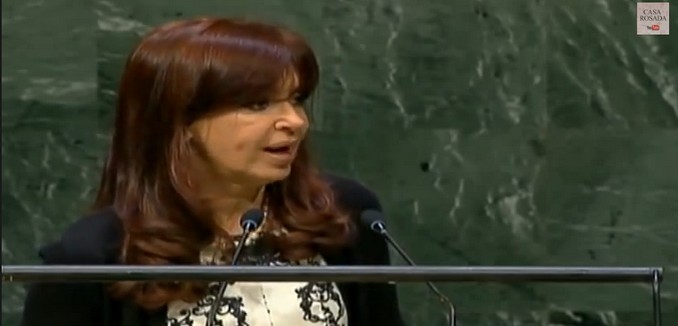A federal judge in Argentina has released a 289-page criminal complaint accusing Argentine President Cristina Fernández de Kirchner of plotting to cover up an investigation into Iran’s possible terrorist activities in that country. The document was released three days after prosecutor Alberto Nisman, who compiled the complaint, died under mysterious circumstances. The Wall Street Journal has more (Google link):
The complaint provides passages from intercepted phone calls and other evidence to bolster Mr. Nisman’s main accusation—that President Cristina Kirchner, Foreign Minister Héctor Timerman and others conspired with Iran to sabotage an investigation into a 1994 terrorist bombing that killed 85 people at a Jewish center here. The complaint was made public late Tuesday by Judge Ariel Lijo.
Mrs. Kirchner, the complaint says, ordered intermediaries to secretly negotiate a deal with Tehran to offer impunity for Iranian suspects in exchange for Iranian oil. Mr. Nisman, 51 years old, who had spent a decade investigating the bombing of the Argentine Israelite Mutual Association center, or AMIA as it was known, had in a previous report he had compiled accused Iran of masterminding the bombing.
Nisman was found dead of a gunshot wound to the head Sunday night, hours before he was due to present his findings to a closed-door session of Congress.
Nisman’s investigation into the AMIA bombing led to Interpol “red notice” arrest warrants being issued against six Iranian officials, including the country’s foreign minister at the time of the bombing, Ali Akbar Velayati, and Ahmad Vahidi, who has served as defense minister. Vahidi received an appointment from current Iranian President Hassan Rouhani to serve as director of the Armed Forces Joint Command Council Strategic Defense Research Center.
In addition to his investigation into the AMIA bombing, Nisman two years ago documented Iran’s extensive terror network in South America. In July 2013, Kirchner’s government prevented Nisman from testifying before the United States Congress about Iran’s terror network in South America. It was noted at the time that Argentina’s trade with Iran had increased from $84 million to $1.2 billion over the first three years of Kirchner’s term as president.
One of the most controversial actions taken by Kirchner was the establishment in 2013 of a joint “truth commission” with the Iranian government to determine who was responsible for the AMIA bombing. In response to criticism of allowing the party implicated in the crime to determine the “truth,” Kirchner lashed out at critics.
In Has Argentina Turned Against its Jews?, which was published in the October 2014 issue of The Tower Magazine, Eamonn MacDonagh reported:
But in her remarks to the United Nations General Assembly on September 24 of this year, President Cristina Fernández de Kirchner of Argentina made a decisive change in the ritual: She took the liberty of very publicly criticizing the representatives of the Argentine Jewish community for opposing a failed pact with Iran that would have set up a joint investigation into the massacre with the Islamic Republic.
To grasp the full nature of both the pact in question and just how outrageous was her criticism of Argentina’s Jews for their opposition to it, readers may wish to imagine the United States setting up a joint commission with the Taliban to investigate the 9/11 attacks, with the entire investigation to be carried out under Taliban supervision in Kabul. Add this to the long history of Argentinian obfuscation—including the indictment of Carlos Menem, who was president at the time of the AMIA attack, on charges of obstructing the investigation—and one can understand why anyone with a sense of decency, much less the actual community that had been targeted, would be infuriated at such a deal. Yet when the Jewish community voiced opposition to it, this is what Argentina’s president said to the nations of the world:
“What happened when we signed the memorandum [with Iran]? All hell broke loose, at home and abroad. The Jewish institutions which accompany us every year suddenly turned against us when every year they had accompanied us to ask for cooperation. When it was decided that there would be cooperation by way of the pact, they accused us of complicity with the Iranian state.”
The sense of betrayal triggered by these words—of the government effectively turning against the community that had been the target of the largest terror attack in the country’s history—was compounded by the fact that the president did not see fit to utter a single word of criticism of the Islamic Republic, which had perpetrated a massive terrorist attack on its sovereign soil. Indeed, she seemed to hint that the entire issue was all but closed, since all her references to the extradition request were in the past tense.
[Photo: casarosada / YouTube ]




